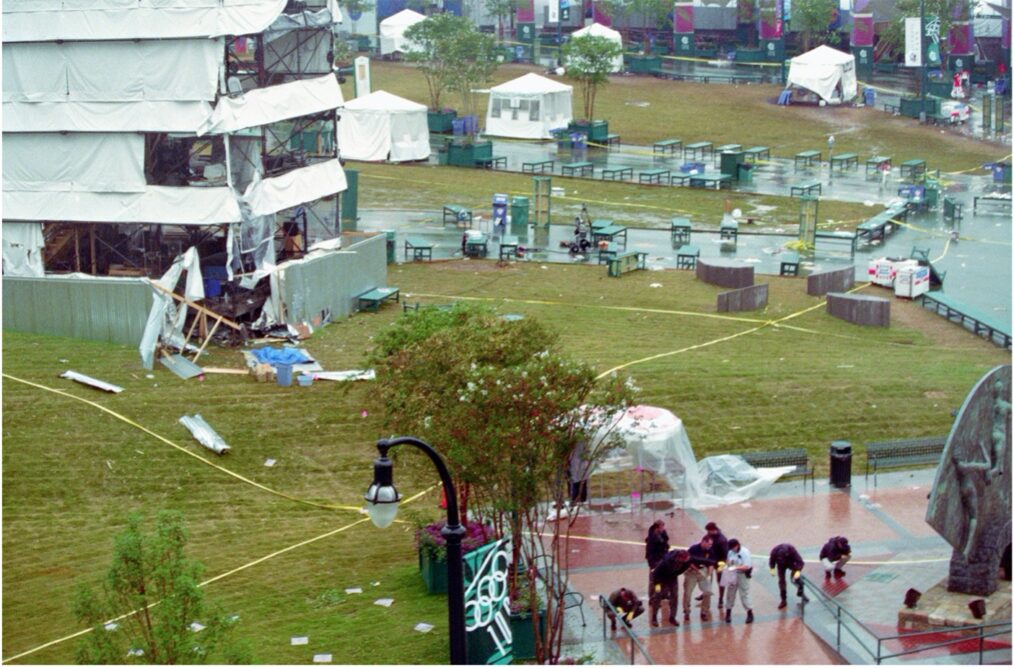
The 1996 Atlanta Olympic Park Bombing and it’s Influence on the 2021 Olympic Games
With the 2021 Summer Olympics less than a month away, there remains a lot of hesitancy from athletes, governments, and fans as many countries are still suffering from the effects of the COVID-19 pandemic. Security officials will have their hands full this year not only worrying about the looming presence of the global pandemic but the major security issues they deal with every year to keep the athletes and the thousands of fans that pack into these facilities safe.
Unfortunately, the Olympics, intended to demonstrate international solidarity, has always attracted the attention of terrorist organizations and individuals, who view them as an opportunity to turn the attention to economic, politics and social issues between countries.
The Centennial Olympic Park bombing in 1996 came as a shock to the world when a 40-pound pipe bomb, equipped with nails and screws, exploded at the outdoor venue in Atlanta, Georgia. In the early hours of July 27th, around 1:00 in the morning, there was an anonymous 911 call claiming “there is a bomb in Centennial Park. You have 30 minutes.” As police began to clear fans out of the park, hundreds of people remained blissfully unaware of the potential risk as they were still gathered in the park celebrating the games.
A short 25 minutes after the call, before they could clear everyone out of the park area, the homemade bomb exploded killing one and injuring at least 111 people. 11 people were hospitalized and a majority of the others who were wounded suffered from shock and minor wounds. President at the time, Bill Clinton, denounced the bombings as “an evil act of terror” and vowed to punish those responsible.
Immediately following the explosion, the only person in custody for the incident was Richard Jewell, the security guard who discovered the backpack containing the explosive device. Originally deemed as a hero, Jewell was quickly vilified. He denied any role in the bombing but was not cleared as a suspect until three months later in October 1996.
Former director of the Federal Bureau of Investigation (FBI), Louis Freeh, stated that “within the FBI’s Domestic Terrorism Program, there is no higher priority than the capture of Eric Robert Rudolph.” It wasn’t until 1998 when the FBI captured and arrested 32-year-old, North Carolina native, Eric Rudolph, in connection with the bombing as well as others during this time. This bombing was the first of four acts of domestic terrorism committed by Rudolph. When he was arrested, he was charged for the Olympic Park bombing, bombings in an Atlanta health clinic and a nightclub as well as an explosion at a women’s clinic in Alabama.
In a special statement to congress about “the Lessons Learned from Security at the Past Olympic Games” then Governor of Massachusetts, Mitt Romney, said, “the after-action reports we received from Atlanta, and the lessons that were passed on to us by the public safety community indicated that many of the problems in Atlanta reflected how slow we were as a nation to begin to recognize that terrorism was becoming a security issue inside the United States.”
This attack at the 1996 Olympics was the second deadly incident that has taken place at the Olympic games. At the 1972 Summer Games in Munich, Germany, nine Israeli athletes were taken hostage and killed by Palestinian terrorists. However, since there were no major security incidents following the events of 1972, not many of the security protocols were changed until after the attack in Atlanta. While safety planning and implementation still varies from country to country, there were many operational lessons that have become a standard in the following years.
One of the biggest improvements made to the functionality of the Olympic Games was the communication and coordination between the local law enforcement and the organizing committee, which can be difficult to maintain due to the public/private sector partnership. Without this alliance, there is no clear command structure often causing many issues.
The Olympic Organizing Committee must work hand in hand with government officials at state, and local levels to ensure public safety during the games. From the strategic layouts of the venues to athlete transportation, every detail is planned out along with contingency plans in place in the case of a security threat. Another precaution taken was much stricter background checks on the 40,000 employees and volunteers at the games.
Terrorism, natural disasters, and public disorder are constant security threats no matter the games’ location. However, there are unique local security risks that also pose threats to the safety of the games. Especially relevant to this year’s Olympics, public health precautions were put into place following the 1998 Winter Olympics in Nagano, Japan when a small outbreak of the flu affected almost one million people who had attended the games.
The Olympic games have been canceled for 2 reasons: world wars and COVID-19. This shows just how seriously the International Olympic Committee takes the safety and security of all attendees at the games and this year will be no different.
